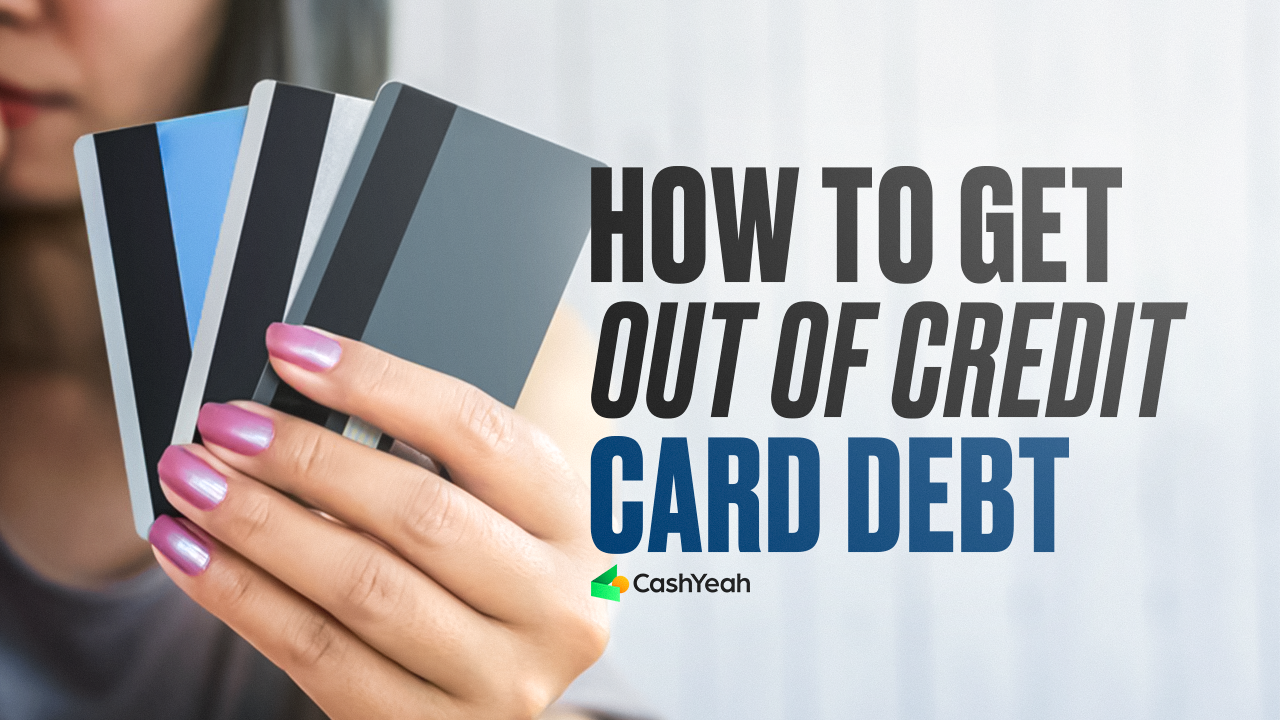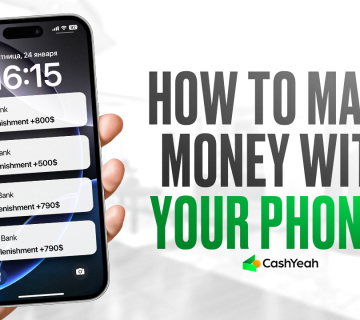Credit card debt can be overwhelming, but there are effective strategies for managing and paying it down. Understanding your options and choosing a repayment plan that fits your financial situation can greatly reduce your overall debt burden. In today’s article, we explore methods to pay off credit card debt and strategies to help you regain control of your finances.
Also, if you ever need to improve your finances, check out CashYeah, where you can earn rewards for tasks, including free money!
What is Credit Card Debt?
Credit card debt accumulates when you use a credit card to make purchases but don’t pay off the full balance by the due date. This debt grows due to interest charges, which are typically high on credit cards, especially if only minimum payments are made each month. Credit card debt can strain your financial health, making it challenging to achieve financial goals. Today, managing your credit card debt is a key skill when learning how to budget.
How Does Credit Card Debt Work?
 Credit card debt occurs when you use a credit card to make purchases, pay bills, or get cash advances, and you don’t pay the full balance by the due date. The credit card company charges interest on the outstanding balance, which can add up quickly.
Credit card debt occurs when you use a credit card to make purchases, pay bills, or get cash advances, and you don’t pay the full balance by the due date. The credit card company charges interest on the outstanding balance, which can add up quickly.
Each month, if you don’t pay off the full balance, interest is applied to the remaining amount, increasing your debt. Additionally, if you make new purchases or take out cash advances, your debt can grow even more. Missing payments can lead to late fees and penalties, further complicating your financial situation.
Why is it Hard to Pay Off Credit Card Debt?
Paying off credit card debt can be challenging due to the high interest rates and fees associated with credit cards. When you only make the minimum payment, a significant portion goes towards interest rather than reducing the principal balance.
This means your debt decreases very slowly, and you end up paying much more over time. Additionally, managing multiple credit cards with high balances can be overwhelming, making it difficult to keep track of payments and prioritize debts. You can also lose your credit score, further putting yourself in a precarious situation. Creating a solid repayment plan and sticking to it is crucial to overcoming these challenges and avoiding further debt accumulation.
The Fastest Way to Get Out of Credit Card Debt
 Getting out of credit card debt requires discipline and a strategic approach. Paying more than the minimum payment each month is one of the fastest ways to reduce outstanding balances. This, however, can make it difficult to build up your budget, if you’re interesting in saving money. Another effective option is consolidating debt through a balance transfer card, which can save on interest costs by offering attractive introductory offers.
Getting out of credit card debt requires discipline and a strategic approach. Paying more than the minimum payment each month is one of the fastest ways to reduce outstanding balances. This, however, can make it difficult to build up your budget, if you’re interesting in saving money. Another effective option is consolidating debt through a balance transfer card, which can save on interest costs by offering attractive introductory offers.
Using a balance transfer card can help manage outstanding credit card debt by allowing you to transfer high-interest balances and pay them off without accruing additional interest during the initial period. Debt consolidation loans may also offer lower interest rates, allowing you to pay off debt faster without as many interest charges.
Make a List of Your Credit Card Debts
To start paying off your credit card debt, make a comprehensive list of all your credit cards. Include the balance, interest rate, and minimum payment for each card. This will give you a clear picture of your total debt and help you identify which cards to prioritize.
You can use a spreadsheet or a budgeting app to track your credit card debt and monitor your progress. By organizing your debts, you can create a more effective repayment strategy and stay motivated as you see your balances decrease.
Determine Your Credit Score
Your credit score plays a significant role in determining the interest rates you qualify for and the credit cards you can get approved for. A good credit score can help you secure lower interest rates and better credit card offers, making it easier to manage and pay off your debt. Having an idea of your credit score can also help you stop wasting money.
You can check your credit score for free on various websites, such as Credit Karma, Credit Sesame, or through the website of one of the three major credit reporting bureaus (Equifax, Experian, or TransUnion). Knowing your credit score can help you make informed decisions about your debt repayment options.
Debt Repayment Methods: Avalanche and Snowball
Two popular debt repayment methods can help eliminate credit card debt:
- Debt Avalanche Method: With this strategy, focus on paying off high-interest balances first while making minimum payments on lower-interest debts. Paying high-interest credit card balances first reduces interest charges over time.
- Debt Snowball Method: This approach involves paying off the smallest balance first to gain momentum and a psychological boost, then moving on to larger balances. The snowball method works well for those motivated by small, quick wins.
Both strategies can be effective, but choosing one depends on your financial goals and personality.
Debt Consolidation Loans and Balance Transfer Cards
For those with significant credit card debt, consolidating debt into one account can simplify payments and reduce interest rates. Debt consolidation loans allow you to combine multiple credit card debts into one loan with a potentially lower interest rate. Balance transfer credit cards also offer promotional 0% APR periods, allowing you to pay down principal without accruing interest for a set period. However, these options often require good or excellent credit scores to qualify for favorable terms.
Minimum Payments and Interest Charges
While making only the minimum payment keeps your account in good standing, it prolongs debt repayment and increases interest charges. Timely monthly payments are crucial for managing debt effectively. Minimum payments barely cover interest, allowing the principal to grow. To avoid accruing more debt, strive to pay above the minimum payment, which reduces your balance faster and minimizes interest.
Automate Your Payments
To avoid late fees and penalties, automate your credit card payments by setting up automatic payments through your credit card company’s website or mobile app. You can also set up automatic payments through your bank’s online banking system.
Negotiate with Your Credit Card Company
If you’re struggling to make payments, reach out to your credit card company to see if they can offer any assistance. They may be willing to temporarily reduce or suspend payments, lower your interest rate, or waive fees.
Be honest about your financial situation and provide documentation to support your request. Credit card companies are more likely to work with you if you’ve been a good customer and have a history of making on-time payments. Negotiating with your credit card company can provide temporary relief and help you get back on track with your debt repayment plan.
The Role of Debt Settlement
 Debt settlement can be a viable option for those struggling to pay off high credit card balances. It is important to understand that debt settlement can significantly affect your credit report, as settled debts are often marked as “settled” rather than “paid in full,” which can negatively impact your credit score.
Debt settlement can be a viable option for those struggling to pay off high credit card balances. It is important to understand that debt settlement can significantly affect your credit report, as settled debts are often marked as “settled” rather than “paid in full,” which can negatively impact your credit score.
Debt settlement involves negotiating with creditors or working with debt settlement companies to reduce the total debt owed. Although debt settlement can reduce the amount you pay, it often has a negative impact on credit scores and may come with fees. Before working with a debt settlement company, check for reputable agencies, as some may charge high fees without effectively reducing your debt.
Using Personal Loans for Credit Card Debt
Personal loans can be used to pay off credit card debt faster by consolidating multiple balances into one monthly payment at a lower interest rate. Student loan debt can also be a significant financial challenge, and understanding available assistance is crucial for borrowers.
Unlike credit cards, personal loans typically have fixed terms and rates, making it easier to plan debt repayment. However, this option only makes sense if the personal loan offers a significantly lower rate than your current credit card APR.
Create a Budget to Free Up More Money
If paying off credit card debt is your priority, creating a realistic budget can help you save money to allocate toward your debt. List essential expenses, then cut non-essentials to generate extra cash each month. Avoiding additional credit card debt and practicing money management are crucial to staying on track.
Conclusion
Credit card debt can feel overwhelming, but with determination, a budget, and an effective repayment strategy, you can regain financial freedom. Whether you choose to consolidate debt, negotiate with creditors, or use structured repayment plans, each step brings you closer to a debt-free future.




